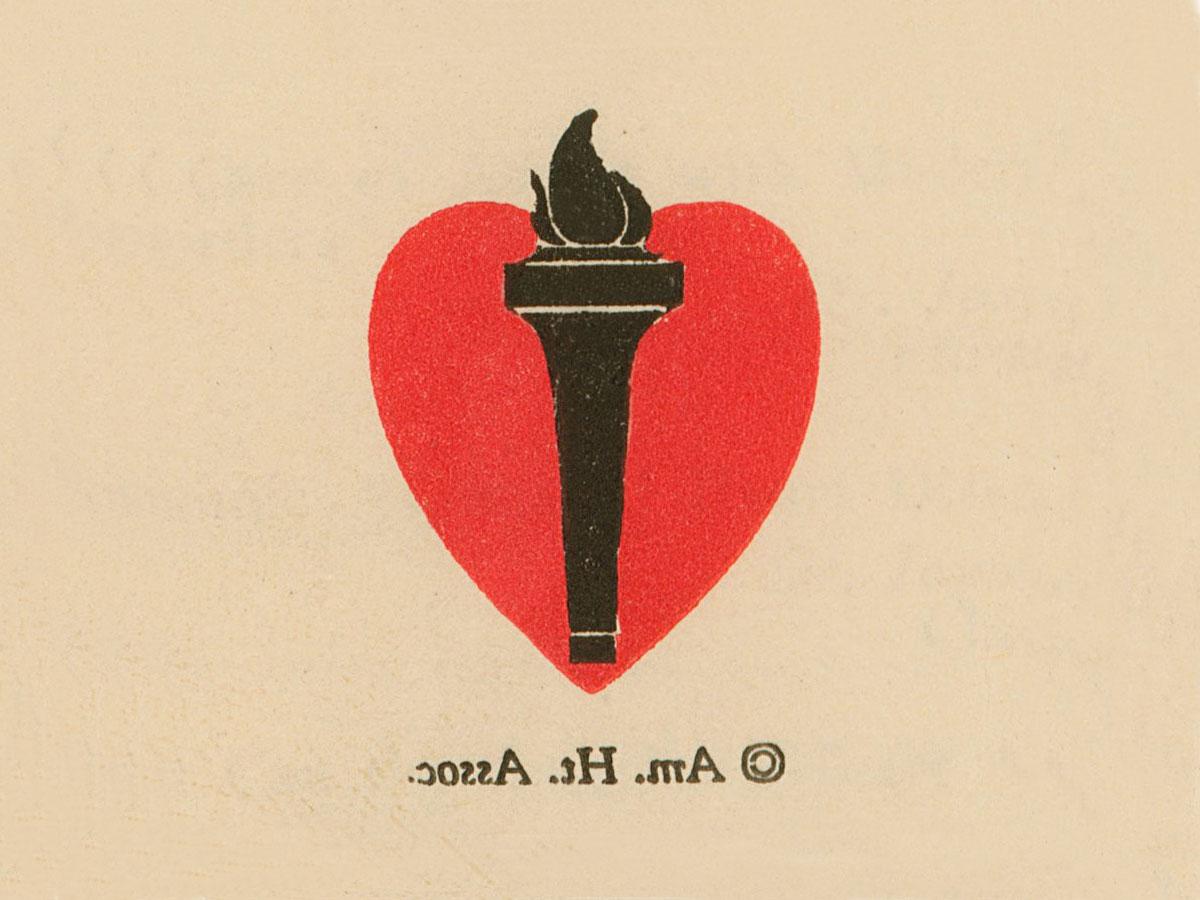Our Lifesaving History

但一些先锋医生和社会工作者认为,情况不必如此. They conducted studies to learn more about heart disease, America’s No. 1 killer. Then, on June 10, 1924, 他们在芝加哥会面,成立了美国心脏协会,他们相信科学研究可以引领更好的治疗方法, prevention and ultimately a cure. The early American Heart Association enlisted help from hundreds, then thousands, of physicians and scientists.
“We were living in a time of almost unbelievable ignorance about heart disease,” said Paul Dudley White, one of six cardiologists who founded the organization.
In 1948, the association reorganized, 从一个专业的科学协会转变为一个由科学和非专业志愿者组成并由专业人员支持的全国性志愿卫生组织.
Since then, 美国心脏协会在国内和国际上的规模和影响力迅速增长,成为一个拥有3500多万志愿者和支持者的组织,致力于改善心脏健康,减少心血管疾病和中风造成的死亡.
以下是美国心脏协会在一个多世纪的救生历史中里程碑的沙巴足球体育平台表:
Our Early History
1915
Looking for Answers: Nearly a decade before the formal creation of the American Heart Association, 医生和社会工作者聚集在一起寻找更多关于心脏病之谜的答案.
1924
American Heart Association is Founded六名心脏病专家组成了美国心脏协会,这是一个医生的专业协会. One of the founders, Dr. Paul Dudley White, 将早年描述为对心脏病“几乎令人难以置信的无知”.
1925
Scientific Sessions Begins美国心脏协会举行了第一次科学会议,科学家和医疗保健专业人员学习最新的发展. The meeting, held every year since except for during World War II, 成长为美国最大的年度心血管会议,也是心血管健康社区的主要国际目的地.
1947
Heart Week Kicks Off: First public campaign kicks off in February to celebrate National Heart Week.
1948
The AHA Reorganizes: The AHA reorganizes, 从一个科学学会转变为一个由志愿者组成、由专业人员支持的自愿卫生组织. Support for the AHA’s mission becomes much more visible, with fundraising activities taking hold in communities and businesses.
First Research Grant Awarded: The association awards its first research grant, to Nobel Prize winner Dr. Albert Szent-Gyorgyi. 这笔拨款帮助研究心脏等肌肉收缩所需的能量. In all, the AHA has funded 15 Nobel Prize winners, including 10 whose AHA-funded work led to the Nobel Prize.
Life-changing Breakthroughs
1956
Steady Hearts当前位置体外除颤器首次在人类中成功地将颤动的心脏恢复到稳定的节奏. Dr. Paul Zoll leads the study, with funding from the AHA.
1957
First Pacemaker Implanted: The first battery-operated, wearable pacemaker is implanted in a patient. The research leading to this discovery, pioneered by Dr. William Weirich and funded by the AHA, led to the development of the fully implanted pacemakers used today.
1960
Implantable Pacemakers Make Way第一例成功的完全植入式心脏起搏器手术是由Dr. William Chardack, who received funding from the AHA. Production of implantable pacemakers quickly gets underway.
The Beginning of Artificial Heart Valve Replacements: The first successful artificial heart valve replacement is performed by Dr. Albert Starr, 他得到了美国心脏协会的支持和液压工程师Lowell Edwards一起开发了机械心脏瓣膜. The Starr-Edwards valve is still used today, along with other artificial heart valves, improving countless lives.
1961
AHA-Funded Research and CPR: AHA-funded research from Drs. William Kouwenhoven, James Jude and Guy Knickerbocker show how CPR can save lives after cardiac arrest. Their research is reported in the Journal of the American Medical Association. We now know that effective bystander CPR can double or triple chances of survival.
Pioneering Microsurgery: Dr. Julius Jacobson performs surgery with the aid of a microscope. He becomes a pioneer in microsurgery with AHA funding. Microsurgery leads to advances in coronary artery surgery, neurosurgery and numerous other procedures.
Recent Achievements
2008
Research Shows Breaths Not Required for CPR: With funding from the AHA, Dr. Gordon Ewy shows uninterrupted, 高质量的胸部按压——不需要口对口呼吸——对保持重要器官的血液循环很重要. As a result, 美国心脏协会发布了新的建议,称旁观者可以跳过口对口的心肺复苏术,使用徒手心肺复苏术来帮助突然晕倒的成年人.
AHA Issues Statement on Hands-Only CPR: The AHA releases a statement about Hands-Only CPR, 他说,目睹成年人突然倒下的旁观者应该拨打911,并通过在受害者胸部中间用力和快速按压来提供高质量的胸部按压. This is a departure from traditional CPR that requires rescue breaths.
Nobel Prize Awarded to Early AHA-Funded Researcher: Dr. 马丁·查尔菲获得2008年诺贝尔化学奖,因为他开发了绿色荧光蛋白作为一种基因标签,可以看到活细胞内部, including heart cells, to better understand how the cells are made and how they work. The AHA funded Chalfie earlier in his career.
2009
AHA Advocacy Efforts Help Lead to Tobacco Oversight美国心脏协会在家庭吸烟预防和烟草控制法案的通过中起到了带头作用. The law lets the FDA regulate tobacco, bans candy-flavored cigarettes and adds large warning labels to tobacco products. Billboard advertising near schools is banned, 烟草公司不能再改变他们的产品,使其更容易上瘾,或做出误导性的健康声明.
2010
2020 Impact Goal Announced美国心脏协会宣布了一项主要目标,即到2020年将所有美国人的心血管健康状况提高20%,同时将心血管疾病和中风的死亡率降低20%. Prevention is a major focus of the 2020 Impact Goal.
2014
AHA Leads Heart Disease and Stroke Research Funding: After 65 years of funding research, AHA’s investment in heart disease and stroke research totals more than $3.5 billion. 美国心脏协会是联邦政府以外心脏病和中风研究的主要资助机构.
2016
One Brave Idea: The AHA establishes One Brave Idea, 一项史无前例的研究计划授予一个专注于治疗心脏病的团队7500万美元. It’s funded through an alliance of the AHA, Verily and AstraZeneca.
AHA Institute for Precision Cardiovascular Medicine: Through the institute, 美国心脏协会为致力于挖掘大量数据以解决一系列心脏病问题的研究人员提供资金. 该研究所开始收集、连接和利用病人的数据来帮助改善心脏健康.
2018
Resuscitation Quality Improvement Partners: The AHA and Laerdal Medical establish RQI Partners as a legal, 合资企业——朝着实现我们的大胆愿景迈出了一大步——一个没有人死于心脏骤停的世界. 以营利为目的的子公司合作伙伴关系专注于复苏质量改进®计划, 与复苏学会基金会共同开发的HeartCode®产品组合和解决方案.
2019
AHA Grantee wins Nobel Prize: Gregg L. Semenza, M.D., Ph.D., 约翰霍普金斯大学的研究人员因发现细胞如何感知和适应氧气供应而获得2019年诺贝尔生理学或医学奖, the mechanism for one of life’s most essential adaptive processes. He shares the prize with William G. Kaelin Jr., M.D., of the Dana-Farber Cancer Institute, Boston and Sir Peter J. Ratcliffe, M.D., of the University of Oxford, England, and Francis Crick Institute in London. 他们的合作工作为理解氧气水平如何影响细胞代谢和生理功能奠定了基础, 为抗击心血管疾病和许多其他急慢性疾病的有希望的新战略铺平道路, including anemia and cancer. Dr. Semenza has received five AHA research grants. The Association’s support of his now Nobel Prize winning work on HIF-1 began in 1993.
